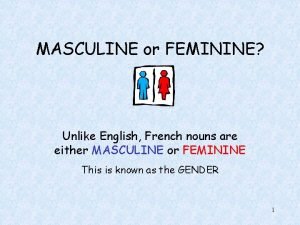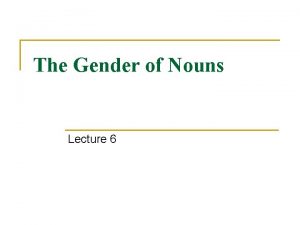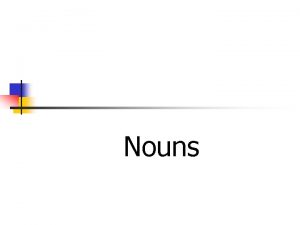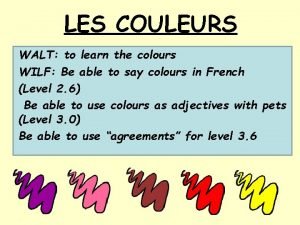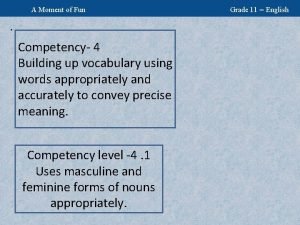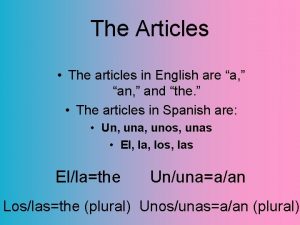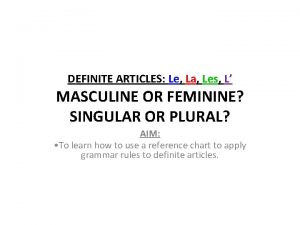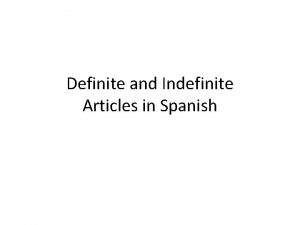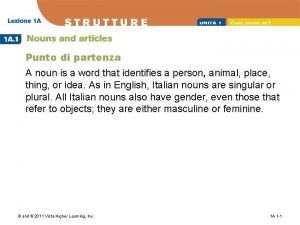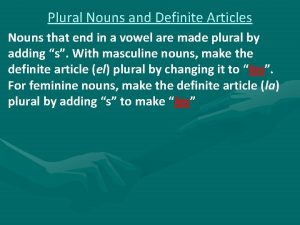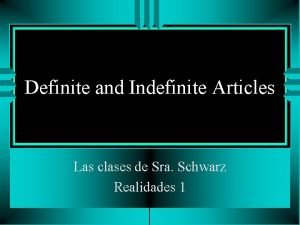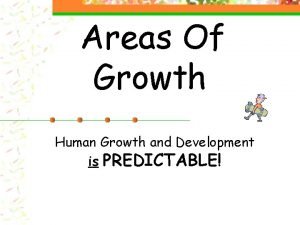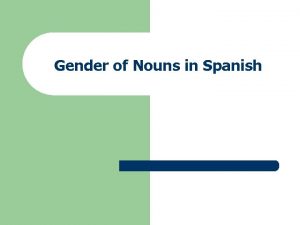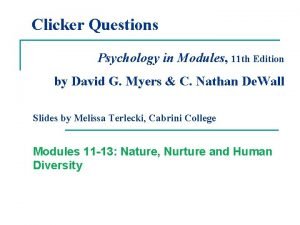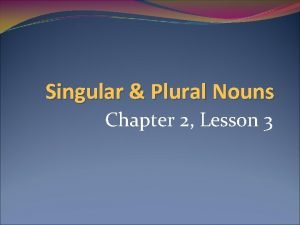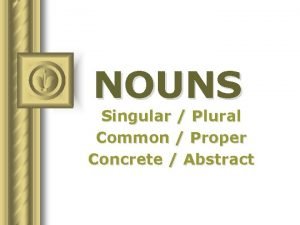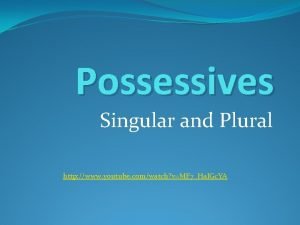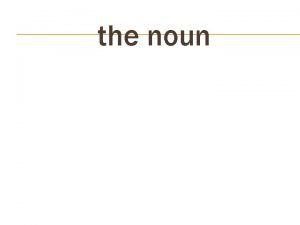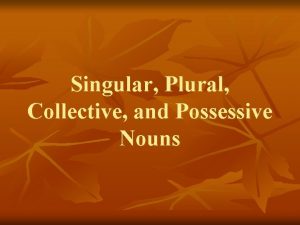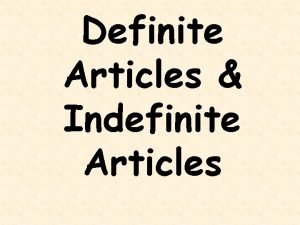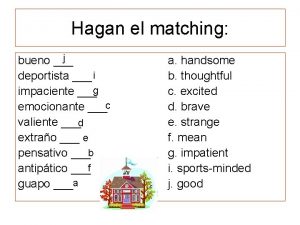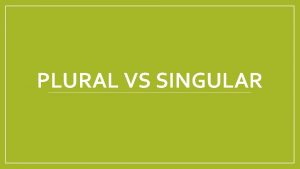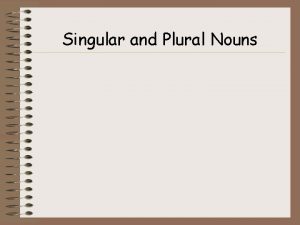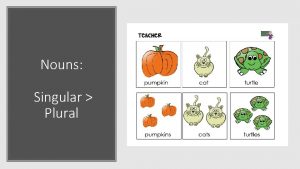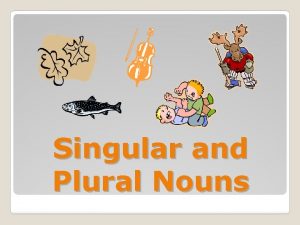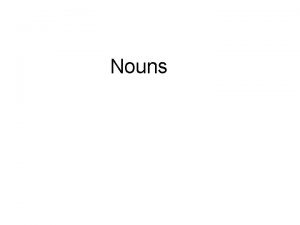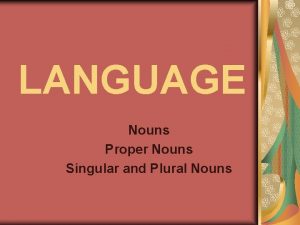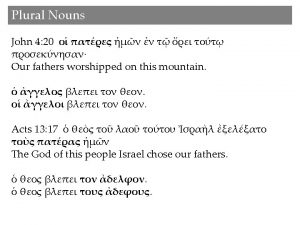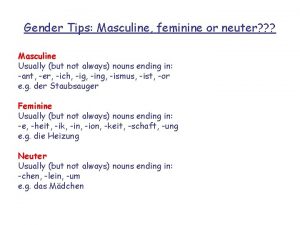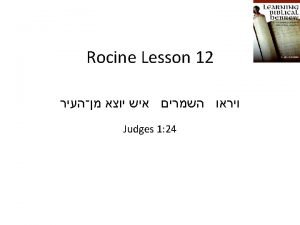1 Masculine feminine nouns 2 Singular and plural















































- Slides: 47

1. Masculine & feminine nouns 2. Singular and plural nouns 3. Definite and indefinite articles 4. Descriptive adjectives 5. Possessive adjectives 6. Present tense of regular verbs 7. Some irregular verbs 8. Stem-changing verbs 9. Reflexive constructions 10. A review of ser versus estar 11. The verb gustar

1 Masculine & feminine nouns El singular y el plural 2 Preliminar A l 05/15/12

Masculine and Feminine Nouns Most words ending in -a are feminine. la palabra, la computadora, la casa, la pintura Some exceptions: el día, el mapa, and words of Greek origin ending in -ma such as el problema, el programa, and el drama. Most words ending in -o are masculine. el libro, el número, el párrafo, el hermano Some exceptions: la foto (photo), la mano (hand), la moto (motorcycle) 3 Preliminar A l 05/15/12

Masculine and Feminine Nouns Words ending in -sión and -ción (equivalent to the English -tion) are feminine. la televisión, la discusión, la información, la lección Words ending in -dad or -tad (equivalent to the English -ty) are feminine. la ciudad, la libertad, la universidad, la comunidad 4 Preliminar A l 05/15/12

2 Singular and plural nouns Singular/plural 5 Preliminar A l 05/15/12

Singular and Plural Nouns v To pluralize nouns in Spanish, there are some rules that should be followed. 1. If the word ends in a vowel, ad -s casas años pies 2. If the word ends in a consonant, add -es. ustedes lección lecciones joven jóvenes 3. If the word ends in -z, change the z to c and add -es. lápiz lápices 6 Preliminar A l 05/15/12 feliz felices

3 Definite and Indefinite articles Los artículos definidos e indefinidos 7 Preliminar A l 05/15/12

Definite and Indefinite Articles v In Spanish, articles and other adjectives mirror the gender (masculine or feminine) or number (singular or plural) of the nouns to which they refer. v An article referring to a singular masculine noun must also be singular and masculine. v The definite article in English is the; the indefinite articles are a, and some. 8 Preliminar A l 05/15/12

Definite and Indefinite Articles Los artículos definidos el estudiante the student (male) los estudiantes the students (males/males and females) la estudiante the student (female) las estudiantes the students (females) La clase es pequeña este año. The class is small this year. Los artículos indefinidos un estudiante a/one student (male) unos estudiantes some students (males/males and females) una estudiante a/one student (female) unas estudiantes some students (females) Ella tiene una tía chilena y unos tíos dominicanos. 9 Preliminar A l 05/15/12 She has a Chilean aunt and some Dominican aunts and uncles.

Definite and Indefinite Articles A● 3 Vamos a practicar Túrnense (take turns) para añadir el artículo definido (the) y el artículo indefinido (a/some) a las siguientes palabras. 1. 2. 3. 4. 5. el/un hermano ______ el/un grupo ______ la/un fiesta ______ a la/un playa ______ a el/un queso ______ 10 Preliminar A l 05/15/12 6. 7. 8. 9. 10. el/un cuaderno _____ el/un suéter _____ el/un diente _____ el/un parque _____ la/un senadora _____ a 11. 12. 13. 14. 15. la/un actriz _____ a el/un pan _____ la/un cama _____ a la/un aventura _____ a el/un pájaro _____

4 Descriptive adjectives Los adjetivos descriptivos 5 Possessive adjectives Los adjetivos posesivos 11 Preliminar A l 05/15/12

Descriptive Adjectives v Adjectives are words that describe people, places, things, and ideas. v In English, adjectives usually come before the nouns they describe. red car v In Spanish, adjctives usually follow the noun. coche rojo 12 Preliminar A l 05/15/12

Descriptive Adjectives v Adjectives in Spanish agree with the noun they modify in number (singular or plural) and in gender (masculine or feminine). Singular and Masculine Javier es un chico cómico. Javier is a funny boy. Singular and Feminine Isabel es una chica cómica. Isabel is a funny girl. Plural and Masculine Javier e Isabel son unos chicos cómicos*. Javier and Isabel are (some) funny children. *When both masculine and feminine are included, use the masculine form. 13 Preliminar A l 05/15/12

Descriptive Adjectives v A descriptive adjective can also follow the verb ser directly. When it does, it still agrees with the noun to which it refers, which is the subject in this case. Javier es cómico. Javier is funny. Marcela es cómica. Marcela is funny. Javier y Marcela son cómicos. Javier and Marcela are funny. 14 Preliminar A l 05/15/12

Possessive Adjectives Los adjetivos posesivos mi, mis my nuestro/a/oa/as our tu, tus your vuestro/a/os/as your su, sus his, her, its, your su, sus their, your v Possessive adjectives agree with the person, place, or thing possessed, not with the possessor. Rosa lleva su diccionario a la clase de español. Sergio llama a sus padres los domingos. v In addition, nuestro and vuestro indicate gender (masculine or feminine). Nuestro coche es azul. 15 Preliminar A l 05/15/12 Nuestra casa es nueva.

Possessive Adjectives v The possessive adjectives tu and tus (your) refer to someone with whom you are familiar and/or on a first name basis. Luisa, ¿tienes tus libros? Luisa, do you have your books? v The possessive adjectives su and sus (your) are used to describe people you would call usted/ustedes (that is, people you treat more formally). Use su/sus (their) also when expressing possession with ellos and ellas. Dr. Ríos, voy a seguir su consejo. Dr. Ríos, I am going to follow your advice. 16 Preliminar A l 05/15/12

Possessive Adjectives mi hermano tu primo su tía nuestra familia vuestra mamá su hija my brother your cousin her / his / your aunt our family your mom your / their daughter mis hermanos tus primos sus tías nuestras familias vuestras mamás sus hijas my brothers your cousins her / his / your aunts our families your moms your / their daughters Nuestros abuelos tienen dos hijos. Our grandparents have two sons. Sus hijos son José y Andrés. Their sons are José and Andrés 17 Preliminar A l 05/15/12

Possessive Adjectives v In Spanish you can also show possession expressing the equivalent of the English (of) mine, yours, his, hers, ours, theirs. Singular Masculine mío tuyo suyo nuestro vuestro suyo Feminine mía tuya suya nuestra vuestra suya 18 Preliminar A l 05/15/12 Plural Masculine míos tuyos suyos nuestros vuestros suyos Feminine mías tuyas suyas nuestras vuestras suyas mine yours (familiar) his, hers, yours (formal) ours yours (fam. ) theirs, yours (formal)

Possessive Adjectives Mi refrigerador funciona bien. El refrigerador mío funciona bien. El mío funciona bien. Possessive adjectives can also become nouns. El mío funciona bien means Mine (noun) works well. Mine (mío) refers to the refrigerator. v Note that the third person forms (suyo/a/os/as) can have more than one meaning. To avoid confusion, you can use: article + noun + de + subject pronoun: el coche suyo = el coche de él/ella/Ud. /ellos/ellas/Uds. his/her/your/their/your (plural) car 19 Preliminar A l 05/15/12

6 y 7 Present tense of regular and irregular verbs Presente indicativo de verbos regulares e irregulares 20 Preliminar A l 05/15/12

Present tense of regular verbs v. Spanish has three groups of verbs that are categorized by the ending of the infinitive. v. In English, an infinitive is expressed by the word to (to have, to be, to speak). v. In Spanish, infinitives end in -ar, -er, or -er. 21 Preliminar A l 05/15/12

Present tense of regular verbs Vebos que terminan en -ar bailar cantar cocinar comprar contestar enseñar esperar estudiar hablar to dance to sing to cook to buy to answer to teach; to show to wait for; to hope to study to speak 22 Preliminar A l 05/15/12 llegar necesitar preparar preguntar regresar terminar tomar trabajar usar to arrive to need to prepare; to get ready to ask (a question) to return to finish; to end to take; to drink to work to use

Present tense of regular verbs Vebos que terminan en -er aprender beber comprender to learn to drink to eat to understand correr creer deber (+ inf. ) leer to run to believe should; must to read Vebos que terminan en -ir abrir compartir 23 Preliminar A l 05/15/12 to open to share describir to describe to write recibir vivir to receive to live

Present tense of regular verbs v To express ongoing activities or actions, use the present tense. Mario lee en la biblioteca. Mario reads in the library. Mario is reading in the library. v You can also use the present tense to express future events. Mario regresa mañana. Mario is coming back tomorrow. 24 Preliminar A l 05/15/12

Present tense of regular verbs v To form the present indicative tense, drop the -ar, -er, or -ir ending from the infinitive and add the appropriate ending to the stem. hablar x comer x vivir x yo hablo como vivo tú hablas comes vives el, ella, Ud. habla come vive nosotros/as hablamos comemos vivimos vosotros/as habláis coméis vivís ellos/as. Uds. hablan comen viven 25 Preliminar A l 05/15/12

Some irregular verbs dar conocer estar hacer poner doy conozco estoy hago pongo das conoces estás haces pones da conoce está hace pone damos conocemos estamos hacemos ponemos dais conocéis estáis hacéis ponéis dan conocen están hacen ponen 26 Preliminar A l 05/15/12

Some irregular verbs salir traer ver ir ser salgo traigo veo voy sales traes vas eres sale trae ve va es salimos traemos vamos somos salís traéis veis vais sois dan traen van son 27 Preliminar A l 05/15/12

Some irregular verbs decir oír venir tener digo oigo vengo tengo dices oyes vienes tienes dice oye viene tiene salimos oímos venimos tenemos salís oís venís tenéis dan oyen vienen tienen 28 Preliminar A l 05/15/12

8 Stem-changing verbs Los verbos con cambio de raíz 29 Preliminar A l 05/15/12

Stem-changing verbs v In Spanish, there is a variety of common verbs that are irregular and are known as stem-changing verbs. Change e ie cerrar (to close) Singular Plural yo cierro nosotros/as cerramos tú cierras vosotros/as cerráis él, ella, Ud. cierra ellos/as, Uds. cierran Other verbs like cerrar (e ie) are: comenzar to begin pensar to think empezar to begin perder to lose; to waste entender to understand preferir to prefer mentir to lie querer to want; to love recomendar to recommend 30 Preliminar A l 05/15/12

Stem-changing verbs Change e i pedir (to ask for) Singular Plural yo pido nosotros/as pedimos tú pides vosotros/as pedís él, ella, Ud. pide ellos/as, Uds. piden Other verbs like pedir (e i) are: repetir to repeat seguir* to follow; to continue (doing something) servir to serve *Note: The yo form of seguir is sigo. 31 Preliminar A l 05/15/12

Stem-changing verbs Change o ue encontrar (to find) Singular Plural yo encuentro nosotros/as encontramos tú encuentras vosotros/as encontráis él, ella, Ud. encuentra ellos/as, Uds. encuentran Other verbs like econtrar (o ue) are: almorzar to have lunch morir to die costar to cost poder to be able to dormir to sleep recordar to remember mostrar To show volver to return Note: The verb jugar (to play) is conjugated same as an o ue stem changing verb although the original stem contains a u instead of an o. Yo juego, tú juegas, él juega, …etc. ue ue 32 Preliminar A l 05/15/12

9 Reflexive constructions Las construcciones reflexivas 33 Preliminar A l 05/15/12

Reflexive constructions Reflexive pronouns Siempre me divierto en las fiestas. I always enjoy myself at parties. Siempre te diviertes en las fiestas. You always enjoy yourself at parties. Siempre se divierte en las fiestas. He/She always enjoys himself/herself at parties Siempre nos divertimos en las fiestas. We always enjoy ourselves at parties. Siempre os divertís en las fiestas. You (all) enjoy yourselves at parties. Siempre se divierten en las fiestas. They/You (all) enjoy themselves/yourselves at parties. 34 Preliminar A l 05/15/12

Reflexive constructions Reflexive pronouns 1. Precede a conjugated verb 2. Can be attached to infinitives and present participles (-ando, -iendo) Me voy a levantar. Voy a levantarme. I am going to get up. ¿Se van a levantar esta mañana? Van a levantarse esta mañana? ¿Are they going to get up this morning? ¡Nos estamos levantando! ¡Estamos levantándonos! We are going to get up! 35 Preliminar A l 05/15/12

Reflexive constructions Verbos reflexivos acordarse de (o-ue) callarse divertirse (e-ie-i) irse lavarse levantarse llamarse maquillarse ponerse (la ropa) ponerse (nervioso/a) quedarse quitarse (la ropa) reunirse sentarse (e-ie) sentirse (e-ie-i) 36 Preliminar A l 05/15/12 to remember to become, keep quiet to enjoy oneself, to have fun to go away, to leave to wash oneself to get up; to stand up to be called, named to put on makeup to put on (one’s clothes) to become (nervous) to stay, to remain to take off (one’s clothes) to get together; to meet to sit down to feel

10 Verbs ser and estar Los verbos ser y estar 37 Preliminar A l 05/15/12

Ser / Estar (estoy, estás, está, estamos, estáis, están) is used: v To describe physical or personality characteristics that can change or to indicate a change in condition Elena está enferma hoy. Elena is sick today. v To describe the location of people or places El cine está en la calle 8. The movie theatre is on 8 th Street. v With the present participle (-ando, -iendo) to create the present progressive ¡Están bailando mucho! They are dancing a lot! 38 Preliminar A l 05/15/12

Ser / Estar Ser (soy, eres, somos, sois, son) is used: v To describe physical or personality characteristics that remain relatively constant Guillermo es inteligente. Guillermo is intelligent. Las casas son pequeñas. The houses are small. v To explain what or who someone or something is La Dra. García es profesora de literatura. Dr. García is a literature professor. Mary es mi hermana. Mary is my sister. 39 Preliminar A l 05/15/12

Ser / Estar Ser v To tell time or to tell when or where an event takes place ¿Qué hora es? Son las nueve. What time is it? It’s nine o’clock Mi clase de español es a las ocho y es en Peabody Hall. My Spanish class is at eight o’clock and is in Peabody Hall. v To tell where someone is from and to express nationality Somos de Cuba. Somos cubanos. We are from Cuba. We are Cuban. 40 Preliminar A l 05/15/12

11 The verb gustar El verbo gustar 41 Preliminar A l 05/15/12

Verb gustar v The verb gustar is used to express likes and dislikes. Me gusta el libro de español. I like the Spanish book. v The person, thing, or idea that is liked is the subject (S) of the sentence. v The person (or persons) who like another person, thing, or idea is the indirect object (IO). 42 Preliminar A l 05/15/12

Verb gustar v. Since most of the things or people that please us are expressed in third person, the two forms of gustar that are most commonly used are: gusta and gustan. Me gusta el traje. I like the suit. What is liked is singular. Me gustan los trajes. I like the suits. What is liked is plural. 43 Preliminar A l 05/15/12

Verb gustar Singular (A mí) me gusta el coche rojo. I like the red car. (A ti) te gusta el coche rojo. You like the red car. (A él) le gusta el coche rojo. He likes the red car. (A ella) le gusta el coche rojo. She likes the red car. (A Ud. ) le gusta el coche rojo. You like the red car. Plural (A nosotros/as. ) nos gusta el coche rojo. We like the red car. (A vosotros/as) os gusta el coche rojo. You (all) like the red car. (A ellos/as) les gusta el coche rojo. They like the red car. (A ustedes) les gusta el coche rojo You (all) like the red car. 44 Preliminar A l 05/15/12

Verb gustar a + pronoun (a mí, a ti, a él) a + noun v These constructions are optional most of the time and may be used for clarification or emphasis. v Clarification is important when using le and les since these indirect object pronouns can refer to different people (him, her, you, them, you all). A él le gusta la música clásica. A Julia le gusta la música clásica. 45 Preliminar A l 05/15/12

Verb gustar Gustar + infinitive v To express the idea that one likes to do something, gustar is followed by an infinitive. Me gusta ir de compras por la noche. I like to go shopping at night. v In that case, you always use the singular form gusta, even when you use more than one infinitive in the sentence. A Juan le gusta ir de compras y salir con sus amigos. Juan likes to go shopping and go out with friends. 46 Preliminar A l 05/15/12

FIN 47 Preliminar A l 05/15/12
 Sac feminine or masculine
Sac feminine or masculine Singular plural nouns
Singular plural nouns Gender of wizard
Gender of wizard N nouns
N nouns Hebrew cardinal numbers
Hebrew cardinal numbers Numbers in hebrew
Numbers in hebrew Colours in french masculine and feminine
Colours in french masculine and feminine Widow feminine
Widow feminine Spanish sentence structure
Spanish sentence structure Identity diffusion
Identity diffusion Is videojuegos masculine or feminine
Is videojuegos masculine or feminine Indfini
Indfini Le la l french
Le la l french The indefinite article in spanish
The indefinite article in spanish Italian articles
Italian articles Una mochila in plural form
Una mochila in plural form Adjective demonstrative francais
Adjective demonstrative francais Is paquete masculine or feminine
Is paquete masculine or feminine Boligrafo definite article
Boligrafo definite article Pasajeros masculine or feminine
Pasajeros masculine or feminine Is pencil masculine or feminine in french
Is pencil masculine or feminine in french When something belongs to you
When something belongs to you Rime masculine feminine
Rime masculine feminine Achieving a masculine or feminine social role
Achieving a masculine or feminine social role Conversacion masculine or feminine
Conversacion masculine or feminine Vestido masculine or feminine
Vestido masculine or feminine Is pantalones masculine or feminine
Is pantalones masculine or feminine Is carro masculine or feminine
Is carro masculine or feminine The acquisition of a traditional masculine or feminine role
The acquisition of a traditional masculine or feminine role Tricky singular and plural nouns
Tricky singular and plural nouns Plural of panda
Plural of panda Singular and plural nouns notes
Singular and plural nouns notes Flower plural form
Flower plural form Plural
Plural Rice uncountable or countable
Rice uncountable or countable Woman is singular or plural
Woman is singular or plural Proper abstract nouns
Proper abstract nouns Youtube possessive nouns
Youtube possessive nouns Nouns ending in o preceded by a vowel
Nouns ending in o preceded by a vowel Singular plural worksheets with answers
Singular plural worksheets with answers Noun contractions
Noun contractions Activity plural
Activity plural Collective noun for antelope
Collective noun for antelope Plural nouns y gender nouns
Plural nouns y gender nouns Indefinite vs definite articles spanish
Indefinite vs definite articles spanish Impaciente feminine singular
Impaciente feminine singular Naif masculine plural
Naif masculine plural Gris plural
Gris plural
